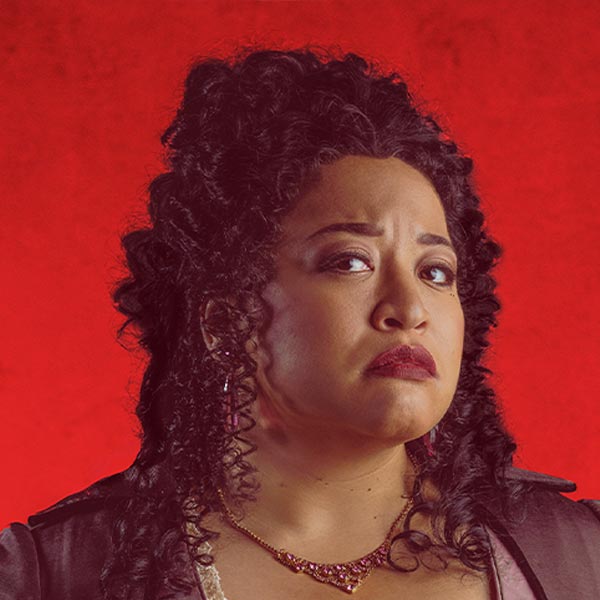
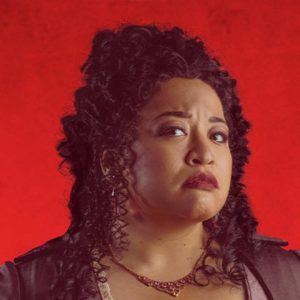 [rating=4] Tosca is one of the world’s most performed and best-beloved operas. Having premiered in 1900, it comes from the tail-end of opera’s classic age, and is one of the operas that most closely matches contemporary dramatic tastes. It is also one of the shows the Lyric Opera of Chicago originally built its reputation on, so it’s a natural choice for the Lyric’s first post-pandemic season. The production is not new, although it is new to Chicago, and under the steady hands of director Louisa Muller and conductor Eun Sun Kim, it does a solid, straight-forward job of telling the story of one of the stage’s greatest heroines, whose name, Floria Tosca, has become a synonym for drama itself.
[rating=4] Tosca is one of the world’s most performed and best-beloved operas. Having premiered in 1900, it comes from the tail-end of opera’s classic age, and is one of the operas that most closely matches contemporary dramatic tastes. It is also one of the shows the Lyric Opera of Chicago originally built its reputation on, so it’s a natural choice for the Lyric’s first post-pandemic season. The production is not new, although it is new to Chicago, and under the steady hands of director Louisa Muller and conductor Eun Sun Kim, it does a solid, straight-forward job of telling the story of one of the stage’s greatest heroines, whose name, Floria Tosca, has become a synonym for drama itself.
In the year 1800, its is still possible for the people of the oppressive Papal State to view Napoleon as a liberating force and eagerly await the return of the revolutionary armies. Unfortunately for our heroes, at the beginning of the play, their political future is very much in doubt. Angelotti (Rivers Hawkins), one of the leaders of the failed Roman revolution, takes refuge in a church where his sister has set up supplies for him. There he meets a sympathetic painter, Mario Cavaradossi (Russell Thomas), who had been using Angelotti’s sister as a model and agrees to secretly help Angelotti escape. Mario’s girlfriend, the renowned singer Floria Tosca (Michelle Bradley) is not political and Mario does not want to endanger her by getting her involved, but she is unhappy that he is doing a rather poor job of hiding somebody and lying to her after painting such a flattering portrait of another woman. The brutal Baron Scarpia (Fabián Veloz), who is in charge of suppressing revolutionary activities, further incites Tosca’s suspicions, secretly assigning her a tail to observe where she goes to confront Mario, suspecting that the place Tosca believes Mario is meeting with a woman is actually where Angelotti is hiding. But Scarpia has an ulterior motive; to seize Tosca for himself, and he’ll stop at nothing to destroy her.
This set-up takes up the first of the three acts, but the second two are much more about Tosca’s state of mind as she struggles to hold out against Scarpia’s cruel manipulations and rescue her lover. The soprano Michelle Bradley, making her Lyric debut, is indeed a charmer and a persuasive actress as a flippant celebrity who finds unexpected strength under pressure. As with an amusing sacristan (Alan Higgs) who archly frets about declining morality, there doesn’t seem to be any heat in Tosca’s initial complaints of jealousy; Bradley’s take on the character is a woman who is aware she is always putting on a performance and enjoys it. Tenor Russel Thomas as Mario is likewise a fun character actor and emotionally uplifting singer. They make a couple whose love is easy to get invested in. If these two performances are rooted in verismo, operatic realism, then glowering baritone Fabián Veliz is equally compelling as the outrageously monstrous Scarpia; a man who casually asides to the audience that he’s at peace with being better suited for ruining people than for love. Scarpia is one of the few non-Disney villains who regularly gets booed at curtain calls, which is a sign of approval in Veliz’s case.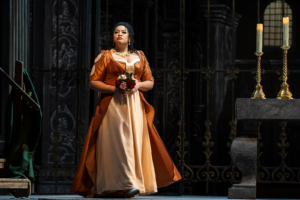
Director Louisa Muller says in the program note that her goal was to make Tosca equally accessible to newcomers as to people who have known it their whole lives. This work certainly has a history; playwright Terrence McNally, whose operas the Lyric has also performed, wrote multiple dramas that were finalists for top awards in the late eighties and nineties centered on characters who were obsessed with Tosca. But Jean-Pierre Ponnelle, who is credited as this production’s set designer, died in 1988, before Tosca had achieved quite that level of metanarrative. If this production is straightforward, that’s hardly a drawback with such a strong libretto and Puccini’s tightly paced music. Conductor Eun Sun Kim never lets the story drag, but neither does it rush through grand spectacles such as the religious procession at the end of Act I or the climactic confrontation between Tosca and Scarpia. If you love Tosca (and I do), this production will probably give you exactly what you want. If you’re not familiar with it, it’s an easy entry point to opera and one of the finest examples of integration between music and storytelling.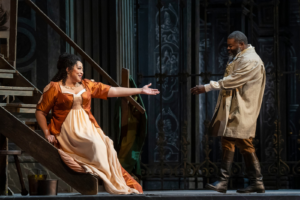
Tosca will continue at the Lyric Opera House, 20 N Upper Wacker Drive, Chicago, thru April 10, with the following showtimes:
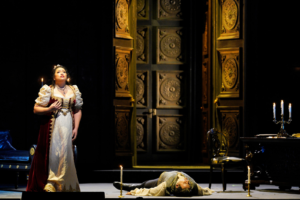 March 18: 7:00 pm
March 18: 7:00 pm
March 23: 2:00 pm
March 26: 7:30 pm
April 3: 2:00 pm
April 7: 2:00 pm
April 10: 2:00 pm
Running time is two hours and forty minutes with two intermissions.
Performances are in Italian with English supertitles. Streams are available to ticket purchasers.
The Lyric offers parking deals with Poetry Garage at 201 W Madison St. if inquired about in advance. Tickets start at $39; to order, visit LyricOpera.org or call 321-827-5600.
To see what others are saying, visit www.theatreinchicago.com, go to Review Round-Up and click at “Tosca.”






More Stories
“The Firebugs” reviewed by Julia W. Rath
“The Book of Grace” Al Bresloff with another from Paul LIsnek
“The Last Five Years” MILWAUKEE